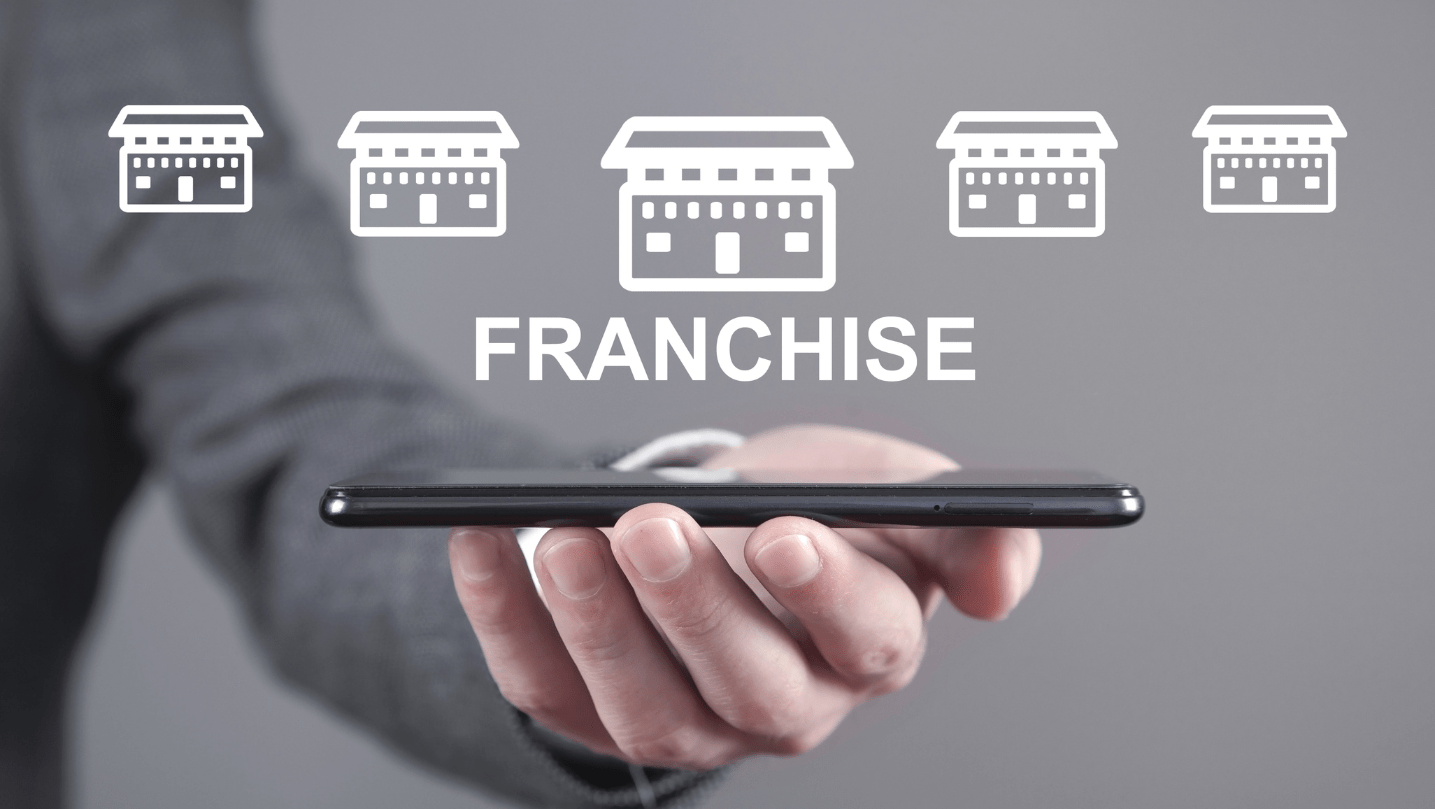Ready to Embark on an Exciting Journey with WIN?
Take the first step toward personal and financial freedom by filling out the interest form. One of our franchise advocates will be in touch with you soon!

Franchising is a distinct business model that combines the drive and passion of entrepreneurship with the structured strategies and proven methods of established brands. It’s a partnership where the franchisee (the entrepreneur) leverages the franchisor’s brand recognition, operational systems, and ongoing support to build a thriving business.
Why is understanding the franchise process pivotal for entrepreneurs? It’s simple. Franchising offers a unique blend of entrepreneurship and stability. Unlike starting a business from scratch, a franchise comes with a roadmap – a tested and tried pathway to success. However, this path is lined with critical decisions, from choosing the right franchise to understanding the financial commitments and adapting to the franchisor’s system.

The franchise model is a unique approach to business ownership, offering a balance of entrepreneurial independence and corporate structure. In essence, franchising is a licensing arrangement where an individual or group (the franchisee) is granted the right to operate a business under the trademark and guidance of an established company (the franchisor).
In a franchise system, the franchisor provides the franchisee with a proven business model, including the brand name, products or services, and operational procedures. The franchisee, in return, pays an initial franchise fee and ongoing royalties to the franchisor. This symbiotic relationship allows the franchisee to start a business with a recognized brand and a tested operational strategy, greatly reducing the risks typically associated with new business ventures.
Instant Brand Recognition: One of the foremost advantages of owning a franchise is instant brand recognition. Established franchises come with a loyal customer base and market presence, which can take years to build from scratch.
Franchises often have a higher success rate compared to start-up businesses. The tried-and-tested business model, along with support from the franchisor, mitigates many common risks of business ownership.
Franchisors provide extensive training and continuous support, ensuring franchisees are well-equipped to operate their business successfully. This includes assistance with training, marketing, product development, and business operations.
As part of a larger network, franchisees benefit from economies of scale in purchasing, advertising, and research and development. This can lead to lower operating costs and increased profitability.
Franchisees become part of an exclusive community of other franchise owners and like-minded individuals. This network provides an invaluable platform for learning best practices, receiving advice, and gaining support.
Embarking on a franchise venture is both an exciting and significant commitment. It requires a unique blend of personal attributes, financial readiness, and time management skills. This self-assessment checklist is designed to help prospective franchisees evaluate their readiness for this unforgettable journey.
1. Are you looking to have a business model, support team and brand already established?
Franchising is a unique balance between entrepreneurial freedom and an established system. Assess your willingness to operate within the parameters set by the franchisor while recognizing that you can bring your innovation and problem-solving skills to the table.
2. Do you have the leadership and people skills needed to be successful?
Successful franchisees are effective leaders. You’ll need to manage staff, interact with customers, and network with other franchisees. Reflect on your experience and comfort level in leadership and interpersonal roles.
3. Are you prepared to take on the risks?
Although not entirely risk-free, franchising does reduce the risks compared to independent business ownership. The higher the risk, the higher the reward, right? Evaluate your comfort with the potential financial and personal risks involved in running a business.
1. What is the initial investment?
Understand the financial requirements of your chosen franchise, including the initial franchise fee, setup costs, inventory, equipment, and working capital. Beyond the investment itself, it’s recommended that you have at least 6 months to a year’s worth of living expenses saved up to help cover your monthly bills while the business gets going.
2. What are the ongoing expenses?
Beyond the initial investment, consider ongoing operational costs, royalties, and marketing fees. Ensure you have a realistic financial plan to manage these expenses.
3. What are your funding options?
These can include personal savings, loans, investor partnerships, or franchisor financing programs. Do some research prior and determine which option aligns best with your financial situation. In some cases, it may not be a bad idea to get pre-approved for a loan.
1. Do your current obligations allow you the time you need to succeed?
Opening and running a franchise demands significant time investment, especially in the beginning. Weigh out your current obligations and determine if you can devote the necessary time to your franchise. If starting a business is important to you, evaluate where you could free up some additional time to work on the business.
2. Do you possess good management skills?
Running a franchise requires a range of management skills, from day-to-day to financial management. Assess your skills in these areas and identify any gaps that might need training or support. Franchising is a great way to get extra support in areas where you might lack.
3. How will business ownership affect your work-life balance?
Finally, consider how owning a franchise will fit into your personal life. Are you prepared for the potential impact on your work-life balance, especially in the early years of the business? Business ownership gives you a lot of personal and financial freedom, but it can strain areas of your life if you don’t manage it correctly. Speak with other franchise owners to understand their work-life balance and what they could look like for you.
Doing a self-assessment is a critical step in your franchising journey. It helps determine not only your readiness for owning a franchise, but also highlights areas where you might need additional preparation or support. Being honest with yourself this early on can set the foundation for a successful and fulfilling franchise experience.

Choosing the right franchise is a pivotal decision in your entrepreneurial journey, and to do so effectively, you’ll need a keen understanding of market trends, industry growth, and potential opportunities. In this section, we’ll explore how to best navigate popular franchising industries and choose a franchise that aligns with your personal and professional goals and skill sets.
When looking for an industry that has promising potential, you’ll need to consider three main factors:
Choosing the right franchise may seem like a daunting task, but it doesn’t have to be if you consider these. Ask yourself, does this industry…
Once you’ve narrowed down to an industry, it’s time to pick a franchise. Here are the top 5 things to look at when comparing franchise opportunities:
Navigating the legal landscape of franchising is an important step that entrepreneurs need to take seriously. Understanding the legalities, from the Franchise Disclosure Document (FDD) to franchise laws, and effectively negotiating a franchise agreement, can significantly impact the success and compliance of your franchise business.
What is an FDD? The Franchise Disclosure Document is a legal document presented by the franchisor to prospective franchisees. It’s updated annually and contains detailed information about the franchise, the franchisor, and the legal and financial aspects of owning a franchise. This information is publicly available to any interested candidate before joining the franchise.
The FDD includes 23 specific items, which cover areas like the franchisor’s background, financial statements, initial and ongoing costs, contractual obligations, and support provided. Pay attention to the sections outlining fees, territory rights, and the franchisor’s litigation history.
The FDD is designed to provide you with enough information to make an informed decision about investing in the franchise. It’s essential to review this document carefully and use it to help you compare different franchise opportunities.
Franchise laws can vary by state. Research any specific requirements or regulations in your state regarding franchising and be aware of them early on in your journey to help navigate this process efficiently. Also, understand how the franchisor’s trademarks and branding can be used, as misuse can lead to legal issues. Pay attention to the terms regarding the renewal, termination, and transfer of the franchise agreement, as these will affect your long-term business planning.
Seek Legal Counsel: A lawyer who specializes in franchise law can help you review and negotiate your franchise agreement. They can also help clarify terms and suggest amendments.
A well-crafted business plan is the cornerstone of any successful franchise. It’s not just a document, but a strategic blueprint that guides every aspect of your franchise journey, from launch to growth and beyond. This section emphasizes the importance of having a business plan, explores its key components, and discusses the role of the franchisor in developing this plan.
A business plan serves as a roadmap, outlining your vision, goals, and how you plan to achieve them. It’s a critical tool for both managing your franchise and communicating its potential to investors or lenders. It also helps in identifying potential risks and challenges and devising strategies to mitigate them, ensuring better preparedness for the uncertainties of business. A well-thought-out business plan is essential for attracting investors or securing financing, as it demonstrates the viability and profitability of the franchise. While a franchise gives you a proven business model, you still have the independence to plan and grow your business how you see fit.
Leverage the training programs and ongoing support provided by the franchisor, which can include operational training, marketing assistance, and business management guidance, and take advantage of the franchisor’s network to gain insights and advice from experienced franchisees, which can be invaluable in refining your business plan. It’s important to make sure that your business plan aligns with the franchisor’s standards and guidelines to maintain brand consistency and operational efficiency.

Understanding the various financing options, approaching potential lenders, and tapping into government support can significantly impact the feasibility and success of your franchise endeavor. This section provides an overview of financing avenues, tips for engaging with banks and investors, and guidance on leveraging government grants and loans.
Just like starting an independent business, there are many financing options available for qualified candidates.
We know that asking for a loan can be an awkward and nerve-wracking experience, but when starting a business, it’s essential to get the funding you need to get your business off the ground. Here’s a step-by-step plan on how to ask banks and investors for a loan for your business:
Step 1: Prepare a well-thought-out business plan and outline financial projections. Lenders and investors will want to see a clear path to profitability and a return on their investment.
Step 2: Be ready to discuss your financials in detail, including startup costs, operating expenses, revenue projections, and cash flow analysis. Have a copy of these numbers on a single sheet for you and the loan officer or investor to have and quickly refer to during the meeting.
Step 3: Be personable and share your story. This will not only break the ice between you and the loan officer or investor, but also help them understand the type of person you are and why you’re looking to start this business. Also, highlight your experience, the franchisor’s track record, market analysis, and any competitive advantages your franchise may have.
Step 4: Be clear about the terms of the loan or investment, including interest rates, repayment schedules, and any equity considerations. Don’t be afraid to ask questions or have them repeat something they said. You must understand this before agreeing to the loan.
Step 5: Always send a follow-up and thank you email. Loan officers and investors meet with a lot of people, so it’s always a good idea to acknowledge the time they took out of their day to have this meeting and consider your business.
Many governments offer loan programs to support small businesses, including franchises. In the U.S., the Small Business Association (SBA) provides several loan options for franchisees. In some cases, these loans may have better rates than traditional banks.
While less common, some government grants are available to small businesses. These grants may focus on specific industries, regions, or types of entrepreneurs (e.g., minorities, women). Research if there are any tax incentives or credits that can reduce the costs of starting and operating a franchise. Finally, explore local economic development programs that may offer financing or support for small businesses. A lot of cities and towns offer programs with significant tax breaks or special pricing (especially if you have a storefront).
Should you choose to grow and expand your business, you’ll likely need extra hands to do so. This section focuses on leveraging franchisor-provided training programs, strategies for hiring and training your team, and how to foster a positive workplace environment.
Most franchisors offer comprehensive initial training programs. These typically cover operational procedures, product or service knowledge, customer service standards, and administrative tasks. While you’ll likely receive this training as a franchise owner, this training may also be available to your staff members. You may also want to consider additional training in cyber-physical security awareness, so your employees are up to date on the latest trends and tools to manage and protect against threats.
Depending on the industry and franchise, ongoing training and continuing education (CE) courses may be available. Make full use of the training materials, manuals, and online resources provided by the franchisor to get the most out of your investment, stay up to date on industry standards, and maintain consistency across the franchise network.
First, you’ll need to develop a recruitment strategy that targets candidates who have the skills needed to do the job and would fit within the work culture. Utilize both traditional and digital recruitment platforms to reach a wide pool of candidates. Next, you’ll need to implement a thorough onboarding process to familiarize your new team members with your franchise’s values, operational procedures, and expectations. Then, utilize the franchisor’s training while also developing customized training plans to address the specific needs of your team and local market conditions. Finally, conduct regular performance reviews and provide feedback to your team. This helps in identifying areas for further training and development.
As the franchise owner, you set the tone for the workplace culture. Demonstrate the values, work ethic, and customer service standards you expect from your team, and encourage teamwork and collaboration among your staff. This can be achieved through regular team meetings, team-building activities, and open communication channels. It’s also important to recognize and reward employees for their hard work and achievements. This boosts morale and encourages a culture of excellence and dedication. Finally, provide your team members with opportunities for career growth and professional development. Employees who feel valued and see a path for advancement are more likely to be engaged and committed to the business.
When it comes to franchising, one industry that stands out for its growth and resilience is home inspection. A home inspection franchise represents a compelling opportunity for entrepreneurs looking to tap into a market that combines both stability and growth potential.
The home inspection industry is inadvertently linked to the real estate market. With real estate transactions happening year-round (both residential and commercial) and home buyers realizing the importance of getting an inspection, the demand for professional home inspection services is on the rise.
Moreover, increased consumer awareness about the importance of home inspections and more stringent real estate regulations have further bolstered the industry. These factors contribute to the growing need for qualified home inspection services. In addition, the integration of new technologies like drones, thermal imaging, and online reporting tools has modernized the industry, making it more efficient and appealing to clients.
One of the key attributes that make home inspection franchises so attractive is their recession-resistant nature. Even in economic downturns, real estate transactions continue, albeit at a slower pace, and home inspections remain a critical part of these transactions. This continuous demand provides a buffer against economic fluctuations, offering a degree of stability to franchisees. Home inspectors are also able to grow their business outside the standard home inspection service, offering clients a wide range of inspection services to generate income year-round.
Here are five reasons why entrepreneurs should seriously consider owning a home inspection franchise:
As we conclude this comprehensive guide, it’s important to acknowledge the exciting and potentially rewarding journey that lies ahead for aspiring franchise entrepreneurs. Franchising offers a unique blend of independence and support, making it an attractive path for many business-minded individuals.

For those specifically interested in a franchise opportunity that aligns with growth, stability, and support, consider WIN Home Inspection. As the #1 ranked and fastest-growing home inspection franchise in the U.S., WIN stands out for its commitment to supporting its franchise owners, better known as Strategic Partners.
Exceptional End-to-End Support: WIN ensures that franchisees are well-equipped to manage and grow their businesses how they want. The marketing support team is incredible in helping you build a brand presence and attract new clients.
Comprehensive Training and Certification Programs: WIN Strategic Partners benefit from extensive in-house training and certifications for over 35 essential services, at no additional cost. This foundation is crucial for delivering quality service and building a reputable business.
A Thriving Community: Being part of WIN means joining a family of experienced and like-minded individuals, sharing their knowledge, and learning and growing together. The culture of camaraderie is unlike any other in franchising and truly sets WIN apart from the rest.
Starting a franchise with WIN Home Inspection uniquely positions you within a growing industry and gives you the tools and support needed to succeed. Whether it’s through training, support, or community, WIN is committed to helping its Strategic Partners thrive!
As you step into the realm of franchising, remember that this is more than just a business decision; it’s a lifestyle choice. With the right mindset, resources, and support, you can turn your entrepreneurial dreams into reality. Your journey to becoming a successful franchise entrepreneur starts now. To learn how you can start a home inspection franchise with WIN, please fill out the interest form, and one of our franchise advocates will contact you soon